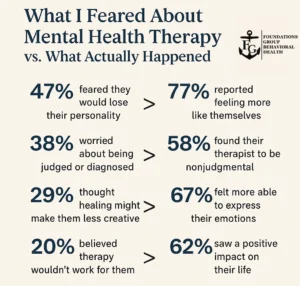I Thought Therapy Would Flatten Me
Before my first therapy session—before I became a clinician, even—I was afraid.
Not afraid of being judged, exactly. Not even afraid of the work.
I was afraid of losing something.
My edge.
My spark.
The parts of me I’d come to associate with emotional depth—even when that depth came from pain.
I hear this same fear in clients all the time:
“If I start therapy, what if I change so much I don’t recognize myself anymore?”
“What if it works—but I lose my voice, my creativity, my fire?”
Especially among people who’ve lived with intensity—anxiety, depression, overthinking, people-pleasing—there’s this secret worry that therapy might flatten them. Like healing will mean becoming dull, soft, less interesting.
But here’s what really happens: therapy doesn’t erase your identity.
It helps you reclaim it—from the noise, the wounds, and the constant internal pressure.
And in my work at Foundations Group Behavioral Health, I’ve seen time and again that therapy doesn’t make people less themselves.
It helps them return to who they were—before fear, burnout, or survival became their full-time job.
If you’re in Massachusetts and looking to take a first step, here’s what to expect from mental health therapy in Cape Cod.
Fear #1: “I’ll Lose My Personality”
It’s one of the most common unspoken fears.
If I stop overthinking… will I still be witty?
If I stop being anxious… will I still care about people the way I do?
The truth is: anxiety, depression, emotional hyper-awareness—those things often get tangled up with identity.
But they’re not you. They’re strategies you learned to navigate life.
And therapy helps you peel them back gently—not all at once.
So what’s left isn’t a blank slate—it’s you, unburdened.
Many people are surprised to find they laugh more. Think more clearly. Sleep better. Connect deeper.
Not because they’ve changed into someone new—but because the fog is clearing.
Fear #2: “I’ll Be Judged or Diagnosed”
TV therapists don’t help this fear much. They’re often shown as cold, silent, or overly clinical.
Real therapy, especially here at Foundations Group, looks very different.
It’s collaborative. Curious. Grounded in respect and safety.
And if you’re someone who’s had to hold it together for years, therapy may be the first place you get to stop performing.
No one here is looking to slap a label on you.
We’re not trying to pathologize your personality.
We’re listening for the why—why you think, feel, and cope the way you do.
And from that understanding, real healing can begin.
For those seeking support nearby, mental health therapy in Barnstable County, MA offers compassionate, stigma-free care close to home.
Fear #3: “If I Heal, Will I Still Be Creative?”
For artists, musicians, writers, and deep feelers, this fear is particularly sharp.
So many people find their way into art through pain.
It becomes the fuel. The muse.
There’s a myth that to create deeply, we must suffer deeply.
But here’s what I’ve seen: therapy doesn’t make people less creative.
It makes their creativity more sustainable.
Instead of spiraling into overwhelm or burnout, they gain clarity and emotional range.
The colors don’t fade—they become easier to choose and shape.
Your voice doesn’t go away.
It just gets clearer, steadier—and less self-destructive.
Fear #4: “Therapy Will Make Me Dependent”
There’s a belief that once you start therapy, you’ll never be able to stop.
That it’ll become a crutch. That you’ll lose your independence.
But healthy therapy isn’t about creating dependency.
It’s about building resilience.
Your therapist isn’t meant to be a lifeline forever—they’re more like a guide who teaches you how to find your own footing.
At Foundations Group Behavioral Health, our goal is to help you learn the tools you need to move through life with more ease—so eventually, you don’t need us every week.
Think of therapy as training wheels—not a lifelong ride-along.
Fear #5: “It Won’t Work for Me”
Some people carry this quiet belief:
“Maybe therapy works for other people. But I’m too complicated. Too stuck. Too everything.”
If you’ve been masking, overachieving, or white-knuckling life for a long time, it’s easy to feel like your pain is the price of being “you.”
But no one is too far gone for help.
And therapy doesn’t require you to be fixed overnight.
It just asks that you show up—honestly, imperfectly, and with curiosity.
And for those who’ve had bad therapy experiences before, that doesn’t mean you’re unhelpable.
It means you haven’t found the right match yet.
You deserve a space that meets you where you are—not where someone else thinks you should be.
If you’re local, mental health therapy in Falmouth, MA might be the right fit to start again—on your terms.
What Actually Happened
Most people don’t feel erased after starting therapy.
They feel remembered.
They say things like:
“I didn’t realize how much of myself I was carrying in survival mode.”
“I’m still me—but it doesn’t hurt as much anymore.”
“I feel like I’m living with the volume turned down a little. In a good way.”
Therapy didn’t flatten them.
It gave them shape.
They didn’t lose their depth.
They gained perspective.
FAQ: Mental Health Therapy at Foundations Group
What happens in a first therapy session?
You’ll meet with a licensed therapist who listens and asks gentle questions to get to know you—not to judge or diagnose you. It’s about building a foundation of trust and understanding your goals.
Do I have to talk about everything right away?
No. You control the pace. You never have to talk about anything before you’re ready. Therapy is a process, not a spotlight.
What if I don’t know what I need help with?
That’s perfectly okay. Many people begin therapy simply knowing they don’t feel like themselves. Your therapist can help you explore and make sense of what’s going on.
Is therapy only for people with a diagnosis?
Not at all. You don’t need a diagnosis to benefit from therapy. It’s a tool for self-understanding, stress management, relationship support, and more.
How do I know if a therapist is the right fit?
It’s okay to try a few sessions before deciding. Trust your gut—if you don’t feel safe or understood, it’s worth finding someone who makes you feel seen.
Ready to Begin?
You don’t have to give up who you are to start healing.
You can hold your depth, your creativity, your sensitivity—and still want peace.
📞 Call 888-685-9730 or visit to learn more about our mental health therapy services in Cape Cod, MA.









